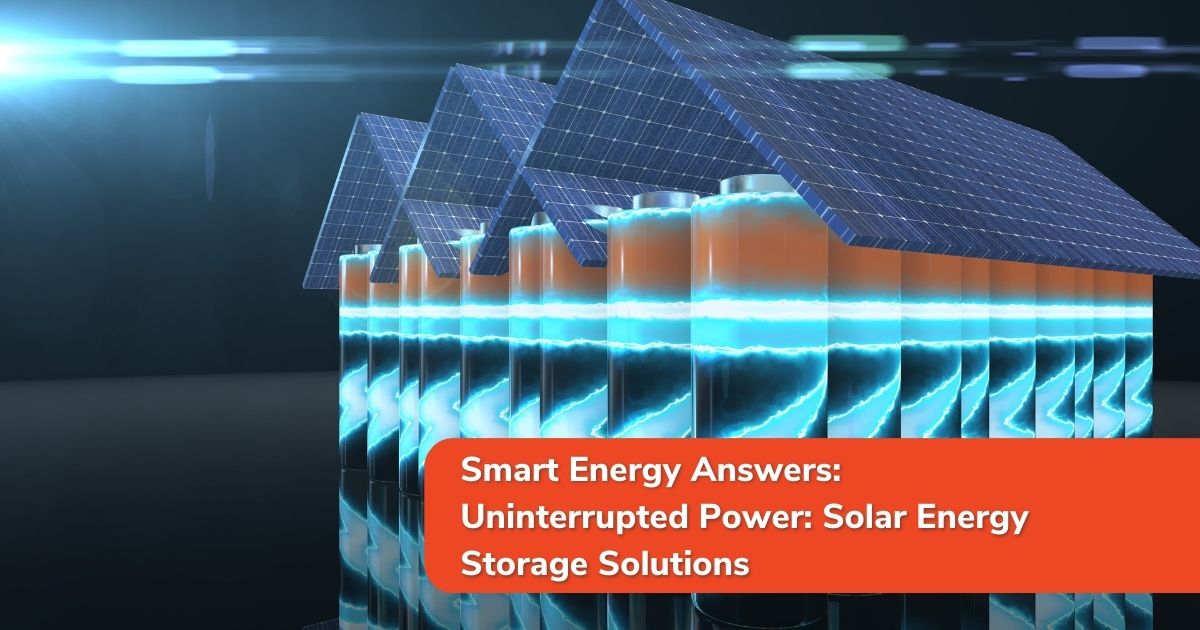Uninterrupted Power: Solar Energy Storage Solutions

Discover how solar energy storage solutions can provide uninterrupted power for your home or business.
The Need for Reliable Energy Storage
Reliable energy storage is crucial for ensuring uninterrupted power supply. As the demand for electricity continues to rise, it is essential to have a reliable backup system in place to prevent power outages. Solar energy storage solutions play a vital role in meeting this need, as they allow for the capture and storage of excess solar energy generated during the day for use during times of high demand or when sunlight is not available. By storing energy from renewable sources like solar power, we can reduce our reliance on traditional energy sources and promote a more sustainable and resilient energy system.
Furthermore, reliable energy storage is particularly important in areas prone to natural disasters or grid failures. In these situations, having a backup power supply can be a lifeline for homes, businesses, and critical infrastructure. Solar energy storage solutions provide a reliable and independent source of power that can keep the lights on and essential services running even during challenging times.
In summary, the need for reliable energy storage is evident in our increasingly energy-dependent world. Solar energy storage solutions offer a sustainable and resilient solution to meet this need, providing uninterrupted power supply and ensuring the lights stay on when we need them the most.
Understanding the Importance of Solar Energy Storage
Solar energy storage is a critical component of a sustainable energy system. While solar panels can generate electricity during the day, the energy produced is not always consumed immediately. Without an energy storage system, this excess energy goes to waste. Solar energy storage solutions allow us to capture and store the surplus energy for later use, maximizing the utilization of solar power and reducing reliance on the grid.
One of the key advantages of solar energy storage is its ability to provide power during periods of low or no sunlight. By storing excess energy generated during the day, solar storage systems can ensure a continuous power supply even when the sun is not shining. This is especially beneficial for off-grid locations or areas with unreliable grid connectivity, as it provides a reliable and independent source of electricity.
Moreover, solar energy storage contributes to the stability and resilience of the overall energy grid. By storing energy locally, we can reduce the strain on the grid during peak demand periods and mitigate the risk of blackouts or brownouts. This decentralized energy storage system enhances the reliability and efficiency of the entire energy network.
In conclusion, understanding the importance of solar energy storage is crucial for transitioning to a sustainable and resilient energy future. By harnessing the power of the sun and storing excess energy, we can ensure uninterrupted power supply, maximize solar energy utilization, and contribute to a more stable and reliable energy grid.
Exploring Battery Storage Technologies
Battery storage technologies play a key role in solar energy storage solutions. These technologies enable the efficient and effective storage of excess energy generated by solar panels for later use. There are several types of battery storage technologies commonly used in solar energy systems, including lithium-ion batteries, lead-acid batteries, and flow batteries.
Lithium-ion batteries are the most widely used battery technology for solar energy storage. They offer high energy density, longer lifespan, and faster charging capabilities compared to other battery types. These batteries are commonly used in residential and commercial solar storage systems due to their compact size and reliability.
Lead-acid batteries are another type of battery technology used in solar energy storage. They are known for their low cost and long lifespan. However, lead-acid batteries have lower energy density and slower charging capabilities compared to lithium-ion batteries. They are commonly used in off-grid solar systems or for backup power.
Flow batteries are a newer type of battery technology that shows promise for large-scale solar energy storage. They use liquid electrolytes stored in external tanks, allowing for flexible scalability and longer lifespan. Flow batteries are particularly suitable for grid-scale applications where high energy capacity is required.
Overall, exploring battery storage technologies is essential for designing efficient and reliable solar energy storage systems. By selecting the appropriate battery technology based on factors such as energy capacity, lifespan, and cost, we can maximize the effectiveness of solar energy storage solutions and ensure uninterrupted power supply.
Maximising Solar Energy Utilisation with Storage Systems
Solar energy storage systems play a crucial role in maximizing the utilization of solar power. While solar panels generate electricity during the day, the energy produced is not always consumed immediately. Without an efficient storage system, this excess energy goes to waste. Solar energy storage solutions allow us to capture and store the surplus energy for later use, ensuring that no solar energy is wasted.
By maximizing solar energy utilization, we can reduce our dependence on the grid and promote a more sustainable energy system. Solar storage systems enable us to use solar power during peak demand periods or when sunlight is not available, ensuring a continuous power supply. This reduces the need to draw electricity from the grid, which is often generated from non-renewable sources.
Moreover, solar energy storage systems can help optimize energy consumption patterns. By storing excess energy generated during the day, we can use it during periods of high electricity demand, such as evenings or cloudy days. This reduces the strain on the grid and helps balance the overall energy supply and demand.
In summary, maximizing solar energy utilization with storage systems is key to harnessing the full potential of solar power. By capturing and storing excess energy, we can ensure a continuous power supply, reduce reliance on the grid, and promote a more sustainable and efficient energy system.
Off-Grid Living: Solar Storage for Independence
Solar storage solutions offer a reliable and independent source of power for off-grid living. In remote areas or locations with unreliable grid connectivity, accessing electricity can be a significant challenge. Traditional power sources may not be available or may be too costly to install and maintain. Solar storage systems provide a practical solution for off-grid living, allowing individuals and communities to generate and store their own electricity.
By harnessing the power of the sun, off-grid solar storage systems can provide a continuous power supply without the need for grid connectivity. These systems capture and store excess solar energy during the day, which can then be used during periods of low or no sunlight. This ensures a reliable source of electricity for essential needs, such as lighting, refrigeration, and communication devices.
Off-grid solar storage also offers independence from fluctuating energy prices and reduces reliance on non-renewable energy sources. By generating and storing their own electricity, individuals and communities can reduce their carbon footprint and contribute to a more sustainable future.
In conclusion, off-grid living can be made more accessible and sustainable through the use of solar storage solutions. By providing a reliable and independent source of power, these systems empower individuals and communities to live off the grid while enjoying the benefits of electricity.
Grid Stability and Solar Energy Resilience
Solar energy storage solutions contribute to the stability and resilience of the overall energy grid. As solar power becomes an increasingly significant part of the energy mix, it is essential to manage its intermittent nature and ensure a stable and reliable energy supply.
By storing excess solar energy, solar storage systems can provide a buffer during periods of high electricity demand or when sunlight is not available. This helps balance the overall energy supply and demand, reducing the strain on the grid and minimizing the risk of blackouts or brownouts.
Solar energy resilience is particularly crucial in areas prone to natural disasters or grid failures. During these challenging times, having a backup power supply can be a lifeline for homes, businesses, and critical infrastructure. Solar storage systems can provide a reliable and independent source of electricity, ensuring that essential services can continue to operate even when the grid is down.
Furthermore, solar energy resilience contributes to the overall sustainability and reliability of the energy system. By integrating solar storage into the grid, we can reduce the need for fossil fuel-based backup power plants, which are often used during peak demand periods. This not only reduces greenhouse gas emissions but also enhances the long-term stability and resilience of the energy grid.
In summary, grid stability and solar energy resilience go hand in hand. By storing excess solar energy and integrating it into the grid, we can ensure a stable and reliable energy supply, reduce the risk of blackouts, and promote a more sustainable energy system.
Environmental Benefits of Solar Energy Storage
Solar energy storage solutions offer several environmental benefits, making them a key component of a sustainable energy system. By capturing and storing excess solar energy, these systems help reduce reliance on fossil fuels and promote the use of clean, renewable energy.
One of the primary environmental benefits of solar energy storage is the reduction in greenhouse gas emissions. By using stored solar energy instead of electricity generated from fossil fuel-based power plants, we can significantly lower carbon dioxide and other harmful emissions. This contributes to mitigating climate change and improving air quality.
Solar energy storage also helps optimize the utilization of renewable energy resources. By storing excess solar energy generated during periods of low demand, we can use it during times of high electricity demand or when sunlight is not available. This reduces the need to rely on non-renewable energy sources and promotes a more efficient use of renewable energy.
Additionally, solar energy storage systems can help reduce energy wastage. Without a storage solution, excess solar energy goes unused and is wasted. By capturing and storing this energy, we can maximize the utilization of solar power and minimize energy wastage.
In conclusion, the environmental benefits of solar energy storage are significant. By reducing greenhouse gas emissions, optimizing renewable energy utilization, and minimizing energy wastage, these systems contribute to a more sustainable and environmentally friendly energy system.
Financial Incentives and Rebates for Solar Storage
Investing in solar energy storage systems can bring several financial incentives and rebates. These incentives aim to promote the adoption of renewable energy technologies and make them more financially accessible for individuals and businesses.
One of the most common financial incentives for solar storage is the government's solar rebate program. This program offers a financial incentive to homeowners and businesses that install solar energy systems, including storage solutions. The rebate amount varies depending on the location and system size but can significantly reduce the upfront cost of installing a solar storage system.
In addition to rebates, many governments also offer feed-in tariffs or net metering programs. These programs allow solar energy system owners to sell excess energy generated by their systems back to the grid. This can offset the cost of purchasing electricity from the grid during periods of low solar generation or high electricity demand.
Furthermore, some utility companies offer time-of-use pricing plans, where electricity rates vary based on the time of day. Solar storage system owners can take advantage of these plans by charging their batteries during off-peak hours when electricity rates are lower and using the stored energy during peak hours when rates are higher. This can result in significant cost savings on electricity bills.
In summary, financial incentives and rebates make solar storage systems more affordable and financially attractive. By taking advantage of these incentives, individuals and businesses can reduce the upfront cost of installation and enjoy long-term savings on energy bills.
Integrating Solar Storage into Existing Systems
Integrating solar storage into existing energy systems is a practical and efficient way to maximize the benefits of renewable energy. By combining solar power generation with energy storage, we can create a more reliable, resilient, and sustainable energy system.
One of the key benefits of integrating solar storage into existing systems is the ability to reduce reliance on the grid. By storing excess solar energy, we can use it during peak demand periods or when sunlight is not available, reducing the need to draw electricity from the grid. This not only reduces energy costs but also promotes a more sustainable energy system by minimizing reliance on non-renewable energy sources.
Moreover, integrating solar storage into existing systems can help optimize energy consumption patterns. By storing excess energy generated during periods of low demand, we can use it during times of high electricity demand, such as evenings or cloudy days. This helps balance the overall energy supply and demand, reducing strain on the grid and enhancing the efficiency of the energy system.
Additionally, integrating solar storage into existing systems can enhance the resilience of the overall energy grid. By decentralizing energy storage and distributing it across different locations, we can reduce the risk of blackouts or brownouts and improve the overall stability of the grid.
In conclusion, integrating solar storage into existing systems offers numerous benefits, including reduced reliance on the grid, optimized energy consumption, and enhanced grid resilience. By combining solar power generation with energy storage, we can create a more sustainable, reliable, and efficient energy system.
Conclusion: Embracing Solar Energy Storage for Continuous Power Supply
Solar energy storage solutions provide a reliable and sustainable way to ensure uninterrupted power supply. By capturing and storing excess solar energy, these systems offer a continuous source of electricity, even during periods of low or no sunlight.
The need for reliable energy storage is evident in our increasingly energy-dependent world. Solar energy storage solutions offer a sustainable and resilient solution to meet this need, providing uninterrupted power supply and ensuring the lights stay on when we need them the most.
By understanding the importance of solar energy storage, we can harness the full potential of solar power and contribute to a more sustainable and resilient energy future. From maximizing solar energy utilization to integrating solar storage into existing systems, there are various strategies to embrace solar energy storage and enjoy the benefits of continuous power supply.
In conclusion, it is time to embrace solar energy storage and unlock the power of the sun for uninterrupted power supply. Let us harness the potential of solar energy storage solutions and pave the way towards a sustainable and reliable energy system.
%20(1).png?width=265&height=96&name=www.smartenergyanswers.com.auhs-fshubfsSmart%20Energy%20Answers%20Logo%20(HIRES)%20(1).png)

.png?width=514&height=121&name=Tesla%20Powerwall%203%20(new).png)








.webp?width=300&height=180&name=sigenergy-gold-installer-300x180%20(1).webp)